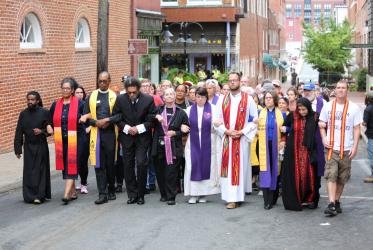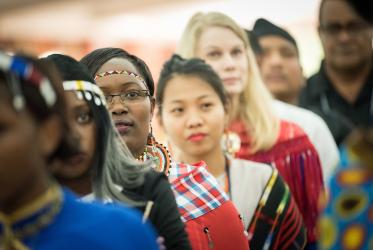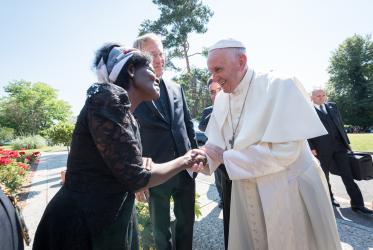A World Council of Churches (WCC) delegation visited Ireland from 28 November to 1 December to explore how the international ecumenical community may best support churches in the global fellowship and work together on the Pilgrimage of Justice and Peace.
The delegation included Dr Clare Amos, programme executive for interreligious dialogue and cooperation, WCC contact person for member church relations in UK and Ireland, Marianne Ejdersten, director of communication and member of the Staff Leadership Group, and the Rev. Garland Pierce, senior assistant to the general secretary of the World Council of Churches. The delegation was hosted by the Most Reverend Dr Michael Jackson, Archbishop of Dublin and Bishop of Glendalough, the Anglican Primate of Ireland.
Part of the delegation went to the border barriers in Northern Ireland that separate Irish nationalist and unionist neighbourhoods.
“Northern Ireland is becoming a more diverse society as people from various countries and cultural backgrounds make their home here. This increasing diversity has the potential to enhance the cultural tapestry of Northern Irish society. However, the influx of people from diverse backgrounds can also cause intercultural tensions which can ultimately escalate into racist violence. The churches can play a significant role in peace building, building bridges between groups, and they have done that for many years instead of building walls,” said Bishop Alan Abernethy of Connor in his introduction to the Irish context.
“The wall, or in fact the Wall, is called peace lines or peace walls. They range in length from a few hundred yards to over three miles (5 km). They may be made of iron, brick, and/or steel and are up to 25 feet (7.6 m) high. Some have gates in them that allow passage during daylight but are closed at night,” said Bishop Alan Abernethy, and he added, “They have been built at urban interface areas in Belfast, Derry and elsewhere. The stated purpose of the wall is to minimize inter-communal violence between different groups.”
“The churches in Ireland are working together and connecting in Christ”, explained Mervyn McCollagh, executive officer at the Irish Council of Churches (ICC). He added, “The Irish Council of Churches was founded already in 1923 in the aftermath of the civil war and is the formal national body through which our member churches engage in dialogue and act on a wide variety of issues. We are established by our member churches and funded by them.” McCollagh underlined the need “to continue the work on reconciliation, healing and peace building.”
The programme of the delegation visit in Belfast included meetings and discussions with the leadership of the Irish Council of Churches, with McCullagh and the Rev Dr Donald Watts, president of the ICC; discussions with the Church of Ireland featuring Bishop Abernethy, Bishop John McDowell of Clogher; the Methodist Church, with the Rev Dr Brian Anderson, president of that church, Rev Dr John Stephens and Kenneth Twyble; and the Roman Catholic Church was represented by the Very Reverend Eugene O’Hagan.
Dr Clare Amos was the guest preacher in St Anne’s Cathedral in Belfast on Advent Sunday morning. In her sermon, Amos reflected on her experiences of living in Beirut where her husband Alan was the chaplain to the Anglican community in both Lebanon and Syria during the Lebanese civil war. Rev. Garland Pierce preached at the Queens University Chapel in Belfast.
The delegation also took part in the ecumenical service of prayer for climate justice and the climate rally at St Anne's Cathedral. Rev. Michael Parker, the canon of St Anne's, said people have a "moral obligation to care for the world and its entire people." "Climate change threatens all that we hold dear, and the message from today's service and rally is that we must join together as churches, workers, activists and leaders to respond now," he concluded.
The rally was organized by groups working on climate change, including Christian Aid, Friends of the Earth, Oxfam Ireland, Queen's University Students' Union and Trócaire.
The delegation was hosted in Belfast by Bishop Abernethy of Connor, a member of the WCC Central Committee. The programme in Belfast included a meeting and guided tour of St Anne’s Cathedral with Rev. Campbell Dixon, cathedral guide Vernon Clegg and meetings with Rev. John Brackenbridge, convenor of the church relations committee of the Presbyterian Church of Ireland, and Rev. Cheryl Meban, representative of the executive committee of World Communion of Reformed Churches, and Rev. Canon Ian Ellis, editor of the Church of Ireland Gazette; press officer Dr Paul Harron and Karen Bushby, diocesan communications officer of Connor.
St Anne’s Cathedral, Belfast and sermon by Dr Clare Amos
Interview with Ireland Gazette











